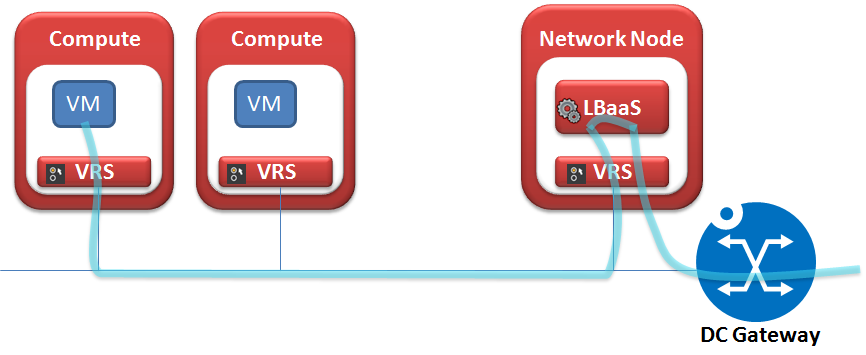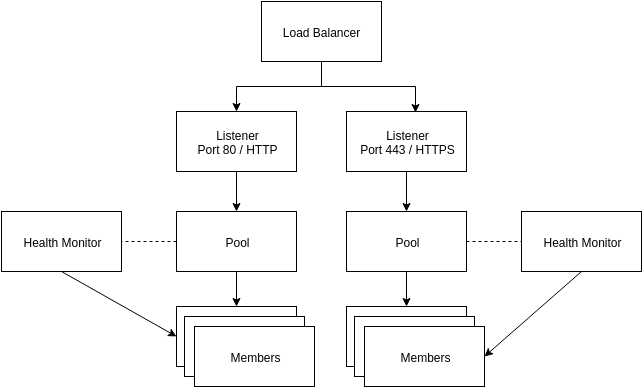Introduction
OpenStack has a pluggable load-balancer framework, commonly referred to as LBaaS. Different implementations are available from both commercial vendors (Eg. F5, RADware, Citrix, AVI), but one can also make use of the opensource HA Proxy implementation. This post will cover how Nuage Networks VSP provides such integration based on a RedHat OSP 8 (Liberty) installation. As usual, the HA Proxy process runs on a network node in a particular namespace.
Similar to other compute nodes, a Nuage VRS has to be installed on this node so that the load-balancer can be tied to the rest of the network. The below diagram shows the deployment architecture:

All the installation steps can be automated of course. On this link, you could find a post install script that can be loaded into your OSPd 8 installation.
LBaaS Architecture
The OpenStack Neutron Networking service offers two load balancer implementation frameworks:
- LBaaS v1: introduced in Juno (deprecated in Liberty)
- LBaaS v2: introduced in Kilo
For its integration, the Nuage Networks VSP has focused on the LBaaS v2 reference architecture which allows you to configure multiple listener ports on a single load balancer IP address. Its concepts are:

- Load balancer: The load balancer occupies a neutron network port and has an IP address assigned from a subnet.
- Listener: Load balancers can listen for requests on multiple ports. Each one of those ports is specified by a listener.
- Pool: A pool holds a list of members that serve content through the load balancer.
- Member: Members are servers that serve traffic behind a load balancer. Each member is specified by the IP address and port that it uses to serve traffic.
- Health monitor: Members may go offline from time to time and health monitors divert traffic away from members that are not responding properly. Health monitors are associated with pools.
OSP Controller LBaaS installation
Assuming that the Nuage Neutron Plugin is already installed, but OSP8 is installed without the LBaaS option.
Install python-neutron-lbaas on controller node:
yum install python-neutron-lbaas
Insert service providers section at the bottom of the /etc/neutron/neutron.conf (don’t use lbaas_agent.ini)
[service_providers]
service_provider=LOADBALANCERV2:Haproxy:neutron_lbaas.drivers.haproxy.plugin_driver.HaproxyOnHostPluginDriver:default
Add service plugin for LBaaS API v2 under default section of the /etc/neutron/neutron.conf
[DEFAULT]
...
service_plugins=neutron_lbaas.services.loadbalancer.plugin.LoadBalancerPluginv2
Run the update script to add LBaaS fields in the neutron database
neutron-db-manage --service lbaas --config-file /etc/neutron/neutron.conf --config-file /etc/neutron/plugins/nuage/nuage_plugin.ini upgrade head
Restart the neutron-server service
systemctl restart neutron-server
OSP Network Node LBaaS installation
Install the Nuage VRS
Following the instructions from the Nuage VSP Install Guide computes:
Uninstall any pre-existing Neutron components
systemctl stop openstack-nova-compute
rpm -e openstack-neutron openstack-neutron-openvswitch
ovs-vsctl show
ovs-vsctl del-br br-int
ovs-vsctl del-br br-tun
rpm -e openvswitch python-openvswitch
Update nova.conf
crudini --set /etc/nova/nova.conf DEFAULT network_api_class nova.network.neutronv2.api.API
crudini --set /etc/nova/nova.conf DEFAULT libvirt_vif_driver nova.virt.libvirt.vif.LibvirtGenericVIFDriver
crudini --set /etc/nova/nova.conf DEFAULT security_group_api neutron
crudini --set /etc/nova/nova.conf DEFAULT firewall_driver nova.virt.firewall.NoopFirewallDriver
crudini --set /etc/nova/nova.conf neutron ovs_bridge alubr0
Install the Nuage VRS
yum install nuage-openvswitch
Configure the VRS and restart the Nuage VRS service
echo ACTIVE_CONTROLLER=<VSC Active controller IP> >>/etc/default/openvswitch
echo STANDBY_CONTROLLER=<VSC Standby controller IP> >>/etc/default/openvswitch
systemctl restart openvswitch
Install the LBaaS Agent
Install the neutron-lbaas-agent package
yum install openstack-neutron-lbaas
Install the Neutron plugin component of Nuage, or more specifically the nuage-openstack-neutron package
yum install nuage-openstack-neutron
If not already installed, install HAproxy on the Network node:
yum install haproxy
Note that when the Network Node is deployed alongside the OpenStack HA set of of controllers, the haproxy.cfg file is already configured, and doesn’t need to be changed.
In case HAProxy was not installed, make sure that the haproxy service is starting correctly and is not trying to listen to a port that is already in use on the system (eg port 5000 by Keystone). Look in the /etc/haprocy/haproxy.cfg to be sure that the port used for binding is not used already.
Add in the default section of the neutron.conf file the following
[DEFAULT]
...
ovs_integration_bridge = alubr0
Update the default section of the /etc/neutron/lbaas_agent.ini file with the following:
[DEFAULT]
ovs_use_veth=False
interface_driver=nuage_neutron.lbaas.agent.nuage_interface.NuageInterfaceDriver
Finally install the iputils packages, and restart the neutron-server and lbaas agent
yum install iputils
service neutron-server restart
service neutron-lbaasv2-agent restart
Using LBaaS in OSP
LBaaS can be used in both VSD-Managed or OpenStack Managed mode of operation.
Creation of the load-balancer:
neutron net-list
+--------------------------------------+-----------+-----------------------------------------------------+
| id | name | subnets |
+--------------------------------------+-----------+-----------------------------------------------------+
| b8dcb948-7392-49b4-a286-39569b6bb4b4 | lbaas | 57001280-a44b-49c1-b02c-02a7079774c8 10.115.54.0/24 |
| d8fe86d2-5f90-42cb-b0bf-a14191b47223 | webserver | 3d7829a9-6624-4344-a9d8-3fde42732760 10.93.48.0/24 |
+--------------------------------------+-----------+-----------------------------------------------------+
neutron lbaas-loadbalancer-create --name lb 57001280-a44b-49c1-b02c-02a7079774c8
Created a new loadbalancer:
+---------------------+--------------------------------------+
| Field | Value |
+---------------------+--------------------------------------+
| admin_state_up | True |
| description | |
| id | c3d947b7-5f3b-4a16-96f1-20b989451ec2 |
| listeners | |
| name | lb |
| operating_status | OFFLINE |
| provider | haproxy |
| provisioning_status | PENDING_CREATE |
| tenant_id | 5a8eb8f5010747c5898ba2b583eef2c0 |
| vip_address | 10.115.54.7 |
| vip_port_id | 818613a6-6bde-48e2-904e-c1ab0b51c812 |
| vip_subnet_id | 57001280-a44b-49c1-b02c-02a7079774c8 |
+---------------------+--------------------------------------+
You can create a listener on port 80
neutron lbaas-listener-create --loadbalancer lb --protocol HTTP --protocol-port 80 --name listenerlb
Created a new listener:
+--------------------------+------------------------------------------------+
| Field | Value |
+--------------------------+------------------------------------------------+
| admin_state_up | True |
| connection_limit | -1 |
| default_pool_id | |
| default_tls_container_id | |
| description | |
| id | 9f2c6479-c6c5-46f9-abdb-a74cccb5dbcd |
| loadbalancers | {"id": "c3d947b7-5f3b-4a16-96f1-20b989451ec2"} |
| name | listenerlb |
| protocol | HTTP |
| protocol_port | 80 |
| sni_container_ids | |
| tenant_id | 5a8eb8f5010747c5898ba2b583eef2c0 |
+--------------------------+------------------------------------------------+
At this stage you should see the LB inserted in your Nuage domain

And a namespace becomes available on your network node
[root@openstack ~(keystone_admin)]# ip netns list
qlbaas-edfacd79-e9ec-4811-8ffe-7cfb8a8b3b03
[root@openstack ~(keystone_admin)]# ip netns exec qlbaas-edfacd79-e9ec-4811-8ffe-7cfb8a8b3b03 ip a
1: lo: <LOOPBACK,UP,LOWER_UP> mtu 65536 qdisc noqueue state UNKNOWN
link/loopback 00:00:00:00:00:00 brd 00:00:00:00:00:00
inet 127.0.0.1/8 scope host lo
valid_lft forever preferred_lft forever
inet6 ::1/128 scope host
valid_lft forever preferred_lft forever
15: tapa5d45f6c-4b: <BROADCAST,MULTICAST,UP,LOWER_UP> mtu 1500 qdisc noqueue state UNKNOWN
link/ether fa:16:3e:86:40:d6 brd ff:ff:ff:ff:ff:ff
inet 10.115.54.7/24 brd 10.115.54.255 scope global tapa5d45f6c-4b
valid_lft forever preferred_lft forever
inet6 fe80::f816:3eff:fe86:40d6/64 scope link
valid_lft forever preferred_lft forever
But also look to the vport created
[root@openstack ~(keystone_admin)]# ovs-appctl vm/port-show
Name: a5d45f6c-4bb3-4e12-a77c-11f9e10af982 UUID: a5d45f6c-4bb3-4e12-a77c-11f9e10af982
port-UUID: 11e6e800-9db3-4e29-a16d-fe4f2de64d41 Name: tapa5d45f6c-4b MAC: fa:16:3e:86:40:d6
Bridge: alubr0 port: 8 flags: 0x0 stats-interval: 60
vrf_id: 20001 evpn_id: 20003 flow_flags: 0x21664004 flood_gen_id: 0x1
IP: 10.115.54.7 subnet: 255.255.255.0 GW: 10.115.54.1
rate: 4294967295 kbit/s burst:4294967295 kB class:0 mac_count: 1
BUM rate: 4294967295 kbit/s BUM peak: 4294967295 kbit/s BUM burst: 4294967295 kB
FIP rate: 4294967295 kbit/s FIP peak: 4294967295 kbit/s FIP burst: 4294967295 kB
Trusted: false Rewrite: false
RX packets:11 errors:0 dropped:5 rl_dropped:0
TX packets:0 errors:0 dropped:0
RX bytes:774 TX bytes:0
policy group tags: 0x400000c 0x300000c 0x2000001
route_id: 0x4
Now you can create a pool to your listener
neutron lbaas-pool-create --lb-algorithm ROUND_ROBIN --listener listenerlb --protocol HTTP --name pool1
Created a new pool:
+---------------------+------------------------------------------------+
| Field | Value |
+---------------------+------------------------------------------------+
| admin_state_up | True |
| description | |
| healthmonitor_id | |
| id | 88c3081d-3f19-4e16-97ed-3dbfabf34963 |
| lb_algorithm | ROUND_ROBIN |
| listeners | {"id": "8e913f9e-5f06-4be9-a155-179f6a423872"} |
| members | |
| name | pool1 |
| protocol | HTTP |
| session_persistence | |
| tenant_id | 5a8eb8f5010747c5898ba2b583eef2c0 |
+---------------------+------------------------------------------------+
List the VMs and the subnet where they are connected
nova list
+--------------------------------------+------+--------+------------+-------------+----------------------+
| ID | Name | Status | Task State | Power State | Networks |
+--------------------------------------+------+--------+------------+-------------+----------------------+
| bd590fb0-fb02-4f0e-b633-a4360815d6ef | web1 | ACTIVE | - | Running | webserver=10.93.48.2 |
| 590c7005-c20f-4806-b7e2-37b8ddefcb8e | web2 | ACTIVE | - | Running | webserver=10.93.48.3 |
+--------------------------------------+------+--------+------------+-------------+----------------------+
neutron net-list
+--------------------------------------+-----------+-----------------------------------------------------+
| id | name | subnets |
+--------------------------------------+-----------+-----------------------------------------------------+
| b8dcb948-7392-49b4-a286-39569b6bb4b4 | lbaas | 57001280-a44b-49c1-b02c-02a7079774c8 10.115.54.0/24 |
| d8fe86d2-5f90-42cb-b0bf-a14191b47223 | webserver | 3d7829a9-6624-4344-a9d8-3fde42732760 10.93.48.0/24 |
+--------------------------------------+-----------+-----------------------------------------------------+
Add the VMs to the pool:
neutron lbaas-member-create --subnet 3d7829a9-6624-4344-a9d8-3fde42732760 --address 10.93.48.2 --protocol-port 80 pool1
Created a new member:
+----------------+--------------------------------------+
| Field | Value |
+----------------+--------------------------------------+
| address | 10.93.48.2 |
| admin_state_up | True |
| id | 6e6141a8-9774-4f43-b5c7-2743b4e8196b |
| protocol_port | 80 |
| subnet_id | 3d7829a9-6624-4344-a9d8-3fde42732760 |
| tenant_id | 5a8eb8f5010747c5898ba2b583eef2c0 |
| weight | 1 |
+----------------+--------------------------------------+
neutron lbaas-member-create --subnet 3d7829a9-6624-4344-a9d8-3fde42732760 --address 10.93.48.3 --protocol-port 80 pool1
Created a new member:
+----------------+--------------------------------------+
| Field | Value |
+----------------+--------------------------------------+
| address | 10.93.48.3 |
| admin_state_up | True |
| id | a2b3f195-dff1-484c-b8fb-0e42914bd895 |
| protocol_port | 80 |
| subnet_id | 3d7829a9-6624-4344-a9d8-3fde42732760 |
| tenant_id | 5a8eb8f5010747c5898ba2b583eef2c0 |
| weight | 1 |
+----------------+--------------------------------------+
You can now look at the HAproxy file built for the LBaas
[root@openstack ~(keystone_admin)]# cat /var/lib/neutron/lbaas/v2/edfacd79-e9ec-4811-8ffe-7cfb8a8b3b03/haproxy.conf
# Configuration for lb
global
daemon
user nobody
group haproxy
log /dev/log local0
log /dev/log local1 notice
stats socket /var/lib/neutron/lbaas/v2/edfacd79-e9ec-4811-8ffe-7cfb8a8b3b03/haproxy_stats.sock mode 0666 level user
defaults
log global
retries 3
option redispatch
timeout connect 5000
timeout client 50000
timeout server 50000
frontend 8e913f9e-5f06-4be9-a155-179f6a423872
option tcplog
option forwardfor
bind 10.115.54.7:80
mode http
default_backend 88c3081d-3f19-4e16-97ed-3dbfabf34963
backend 88c3081d-3f19-4e16-97ed-3dbfabf34963
mode http
balance roundrobin
option forwardfor
server a2b3f195-dff1-484c-b8fb-0e42914bd895 10.93.48.3:80 weight 1
server 6e6141a8-9774-4f43-b5c7-2743b4e8196b 10.93.48.2:80 weight 1